Dreaming of owning a slice of paradise? Buying land in the Caribbean offers you the chance to turn that vision into reality. With its stunning beaches, vibrant culture, and year-round tropical climate, the Caribbean is a top destination for those seeking an investment opportunity or a serene escape from the everyday hustle.
Whether you’re planning to build a vacation home, start a business, or secure a long-term investment, the region presents a range of options to suit your goals. From lush hillside plots to oceanfront properties, each island offers unique opportunities and legal considerations you’ll want to explore.
Navigating the process might seem overwhelming, but with the right guidance, it’s simpler than you think. Understanding local regulations, market trends, and property values will ensure your journey to owning Caribbean land is as smooth as the gentle island breeze. Let’s dive into what you need to know.
Caribbean Real Estate: Best Practices for Buying Land in the Region
Introduction to Land Investment in the Caribbean
Land investment in the Caribbean offers diverse opportunities to build wealth and secure prime real estate in one of the world’s most desirable regions. Understanding the specific property acquisition process and legal requirements across each island reduces risks associated with cross-border investment.
Start by researching ownership laws, as some islands follow British common law systems—ensuring transparent transactions and strong property rights. Focus on countries with established infrastructure and emerging real estate markets, as they often provide higher returns on investment. Consulting a local real estate attorney or agent familiar with the region’s regulations ensures compliance and simplifies the acquisition process.
Why Invest in Caribbean Land?
Caribbean land offers significant investment potential due to its growing appeal among international buyers. Land banking is a viable strategy here, given the region’s uncorrelated real estate markets and untapped development opportunities. Booming tourism contributes to increasing property demand, making it ideal for vacation rentals, resort development, or residential communities.
Political stability and tax incentives offered by certain nations enhance the financial viability of owning land. For example, some islands provide no capital gains taxes, attracting long-term investors. Purchase land positioned near key infrastructure developments, such as airports or port cities, to capitalize on market trends and projected growth in property values.
Overview of Caribbean Real Estate Markets
Caribbean real estate markets vary widely by island, with prices and regulations influenced by local supply and demand. Understanding market trends is vital to determining the optimal location for your investment. Islands like Barbados and the Bahamas typically have established markets, while nations like Dominica and St. Kitts offer affordable land options with high growth potential.
Legal requirements often differ between islands; for instance, some countries restrict foreign ownership or require government approval. Analyze tourism-driven islands for higher-income opportunities, and if land banking appeals to you, target emerging markets ready for urbanization. Use a market-based approach, focusing on property type, location benefits, and future development plans.
Advantages to Owning Land in the British Caribbean

The British Caribbean offers unique advantages for land ownership, supported by its legal framework, secure registration systems, and investment-friendly environment. These factors enhance its appeal for individuals seeking property for personal or investment purposes.
British Common Law and Property Ownership
British common law governs property ownership in the British Caribbean, ensuring a well-regulated and transparent property acquisition process. This legal framework provides clear rules for buying, selling, and inheriting land, reducing disputes. Islands such as the Cayman Islands, the British Virgin Islands, and Anguilla follow these principles, giving property owners strong legal protections.
Under British common law principles, freehold ownership is commonly available, meaning you own the land outright rather than leasing it. This contrasts with territories governed by other legal systems, offering more security in terms of rights. Compliance with local legal requirements, such as conducting due diligence and obtaining thorough title checks, ensures smooth transactions. Clear ownership rights and adherence to established laws position the British Caribbean as a stable and reliable region for land investments.
Guaranteed Title Security and Land Registration
The British Caribbean provides guaranteed title security supported by robust land registration systems. Governments in territories like Bermuda and Montserrat maintain comprehensive land registries where property ownership records are publicly accessible. These systems limit fraudulent claims and simplify the verification process during purchases.
With registered land, your investment remains safeguarded due to legally recognized documentation. Proper registration ties ownership directly to you, offering long-term title security. This reliability attracts investors aiming to maximize investment potential, particularly in land banking—a strategy where properties are held for value appreciation.
By ensuring title guarantees and promoting secure transactions, the region reinforces trust in its real estate markets. Territories benefiting from these systems align with the investment goals of individuals seeking stable, growth-oriented opportunities in uncorrelated global markets.
The Land Acquisition Process

Navigating the land acquisition process in the Caribbean involves understanding country-specific legal requirements and ensuring compliance with local property laws. Comprehensive preparation is key to making informed decisions in a market with significant investment potential.
Steps to Purchase Land in the Caribbean
Start by identifying your purpose for buying land to narrow options based on location, size, and your budget. Research the property’s title and ownership status to confirm it’s freehold or leasehold, as freehold offers greater security. Verify any zoning regulations to ensure the land aligns with proposed uses like residential, agricultural, or commercial development.
Conduct due diligence on ownership through the island’s land registry to avoid disputes. Request a survey to verify boundaries and confirm land rights. Secure financing locally if needed; some islands collaborate with banks offering loans to international buyers. Finalize your purchase by signing a sales agreement and transferring ownership after meeting legal and tax obligations like registration fees or stamp duties.
Working with Real Estate Agents and Legal Advisors
Collaborate with licensed real estate agents who understand local market trends and property laws. Trusted agents offer insights on profitable locations, land banking opportunities, and upcoming growth areas like Dominica or Grenada.
Engage a qualified legal advisor to navigate legal requirements, review contracts, and ensure compliance with British common law or local regulations where applicable. They confirm the absence of encumbrances and guide you through titling processes in regions like Barbados or the Bahamas. Combining professional expertise reduces risks and strengthens your position during the property acquisition process.
Investment Potential in Caribbean Land

Caribbean land offers unique investment potential fueled by diverse property acquisition opportunities, favorable legal requirements, and attractive market trends. Its uncorrelated real estate markets and land banking potential make it a compelling choice for growth-focused investors.
Land Banking Opportunities
Land banking, the practice of purchasing underdeveloped land for future profit, presents significant potential in the Caribbean. With many islands offering affordable plots, such as Dominica and St. Kitts, you can secure property in areas primed for growth. These emerging markets attract investors due to their expansion of tourism infrastructure and government incentives, creating opportunities for long-term value appreciation.
Favorable legal frameworks, especially on islands governed by British common law, enhance land banking’s appeal. Clear property titles, robust registration systems, and freehold ownership provide security for your investment. For example, Montserrat and Bermuda guarantee transparent acquisition processes, making them ideal regions for market entry. With rising international demand for Caribbean real estate, land banking here aligns with growth-oriented investment strategies.
Uncorrelated Real Estate Markets
The Caribbean’s real estate markets operate independently of major global housing trends, providing a safeguard against global economic shifts. While established markets like Barbados and the Bahamas show steady appreciation, smaller islands like Nevis and Grenada offer untouched investment opportunities at lower entry costs. This diversification reduces the risks associated with correlated market fluctuations.
Legal systems based on British common law strengthen investment confidence. Islands such as the Cayman Islands ensure structured property acquisition, protecting your assets in a region with stable political governance. Expanding tourism, international interest, and tax incentives add layers of resilience to these markets, allowing you to navigate market trends with minimal impact from external economic factors.
Market Trends in the Caribbean

Caribbean real estate markets offer diverse opportunities for land investment, with varying trends across islands influenced by tourism, infrastructure development, and international demand. Staying informed about these trends ensures your investment aligns with market dynamics.
Emerging Hotspots for Land Investment
Emerging destinations like Dominica, St. Kitts, and Grenada attract investors due to affordable land prices and high growth potential. Government incentives, such as citizenship-by-investment programs, further enhance their appeal. Dominica, for example, has seen a surge in eco-tourism projects, making land purchases ideal for commercial ventures.
Tourism-driven development in islands like St. Lucia and Antigua also bolsters their investment profile, supported by infrastructure expansion and rising tourist arrivals. These markets combine affordability with strategic opportunities for land banking. Conversely, well-established markets like Barbados and the Bahamas provide stable growth but come with higher land costs.
Key Factors Driving Real Estate Growth in the Region
Tourism remains the primary driver of Caribbean real estate growth. Proactive government policies promoting tourism and foreign direct investment enhance land acquisition opportunities. For example, nations like the Bahamas have robust tourism industries generating consistent demand for new residential and commercial developments.
Favorable political climates and tax incentives, such as no capital gains taxes in Cayman Islands, also attract investors. British common law across numerous islands ensures secure property acquisition, reinforcing buyers’ confidence. Legal frameworks in jurisdictions like Montserrat guarantee title security, reducing risks. Market trends indicate increasing interest in uncorrelated real estate markets, which offer financial resilience and steady long-term appreciation, particularly for activities like land banking.
Challenges and Considerations

Navigating Local Regulations and Zoning Laws
Understanding local regulations and zoning laws is essential when purchasing land in the Caribbean. Each island has distinct legal requirements and property classifications that affect how land can be used. Failing to comply with these laws could complicate your property acquisition process or limit its intended use.
Research land-use regulations in your target location, such as residential, agricultural, or commercial zoning permits. For example, some islands like St. Kitts restrict foreign buyers from acquiring beachfront land, while others like Barbados impose zoning limitations on certain developments. Verify any special restrictions tied to eco-conservation areas that may impact construction plans.
Work with local real estate agents and attorneys to review compliance details during the acquisition process. They can help clarify ownership types under British common law and ensure a smooth transfer of title. A thorough review of zoning laws and adherence to legal frameworks strengthens your investment potential while avoiding costly legal issues.
Managing Risks in Caribbean Land Investment
Investing in Caribbean land carries unique risks that require proactive management. Due diligence is critical, especially given regional market trends and varying ownership laws. Inconsistent title deeds, unrealized land encumbrances, or limited land banking opportunities can pose challenges for inexperienced buyers.
Perform a detailed title search to confirm ownership and any existing liens on the property. Use experienced legal professionals to examine contracts and land use rights. For added security, focus on islands like Bermuda or Montserrat with robust registration systems that provide guaranteed title security under British common law.
Assess natural disaster risks, considering the region’s exposure to hurricanes and earthquakes. Incorporate insurance costs into your budget, and look for properties in locations with government-backed disaster resilience measures. Staying informed about market trends also helps mitigate risks, enabling smarter decisions while exploring the Caribbean’s uncorrelated real estate markets.
Conclusion
Buying land in the Caribbean offers a unique blend of opportunity and lifestyle, whether you’re seeking investment potential or a personal retreat. With its diverse markets, favorable legal systems, and growing international interest, the region stands out as a promising destination for land acquisition.
By taking the time to understand local regulations, market trends, and legal requirements, you can make well-informed decisions and minimize risks. Partnering with experienced professionals ensures a smoother process and strengthens your position as a buyer.
The Caribbean’s combination of natural beauty, economic growth, and investment-friendly policies makes it an appealing choice for those ready to explore its vast potential.